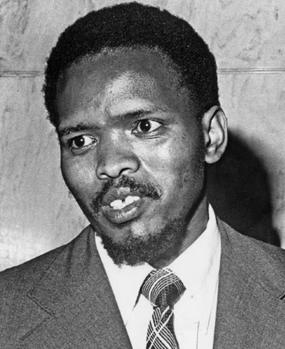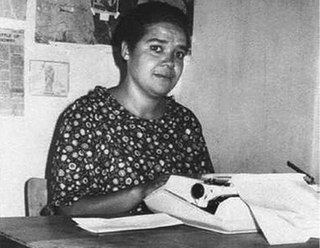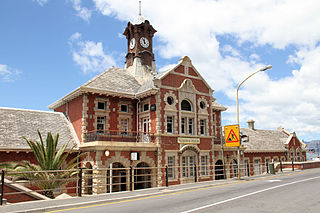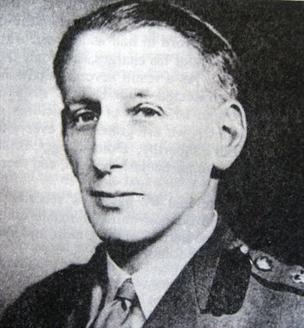Related Research Articles

Bantu Stephen Biko was a South African anti-apartheid activist. Ideologically an African nationalist and African socialist, he was at the forefront of a grassroots anti-apartheid campaign known as the Black Consciousness Movement during the late 1960s and 1970s. His ideas were articulated in a series of articles published under the pseudonym Frank Talk.

The very first modern humans are believed to have inhabited South Africa more than 100,000 years ago. In 1999, Unesco designated the region the Cradle of Humankind World Heritage site. South Africa's first known inhabitants have been referred to as the Khoisan, the Khoekhoe and the San. Starting in about 1,000 BCE, these groups were then joined by people who migrated from Western and Central Africa during what is known as the Bantu expansion southwards through Africa.

Dennis Vincent Brutus was a South African activist, educator, journalist and poet best known for his campaign to have South Africa banned from the Olympic Games due to its racial policy of apartheid.

Bessie Amelia Emery Head was a South African writer who, though born in South Africa, is usually considered Botswana's most influential writer. She wrote novels, short fiction and autobiographical works that are infused with spiritual questioning and reflection.

Apartheid was a system of institutionalised racial segregation that existed in South Africa and South West Africa from 1948 to the early 1990s. Apartheid was characterised by an authoritarian political culture based on baasskap, which ensured that South Africa was dominated politically, socially, and economically through minoritarianism by the nation's dominant minority white population. According to this system of social stratification, white citizens had the highest status, followed by Indians and Coloureds, then Black Africans. The economic legacy and social effects of apartheid continue to the present day, particularly inequality.

Muizenberg is a beach-side town in the Western Cape, South Africa. It is situated where the shore of the Cape Peninsula curves round to the east on the False Bay coast. It is considered to be the main surfing spot in Cape Town and is currently home to a surfing community, centered on the popular 'Surfer's Corner'.

Sir Basil Ferdinand Jamieson Schonland OMG CBE FRS was noted for his research on lightning, his involvement in the development of radar during World War II and for being the first president of the South African Council for Scientific and Industrial Research.

Paul Tiyambe Zeleza is a Malawian historian, literary critic, novelist, short-story writer and blogger at The Zeleza Post. He was (2009) president of the African Studies Association. He was the Vice-President for Academic Affairs at Quinnipiac University. He is the current Vice Chancellor of the United States International University Africa, located in Nairobi, Kenya.

Sir Abraham Bailey, 1st Baronet, known as Abe Bailey, was a South African diamond and gold tycoon, politician, financier and cricketer.
Professor Hendrik W. (H.W.) van der Merwe was a South African academic, a Quaker, and a pioneer of conflict resolution. He founded the Abe Bailey Institute for Inter-Racial Studies at the University of Cape Town in 1968.

John Gibbs St. Clair Drake was an African-American sociologist and anthropologist whose scholarship and activism led him to document much of the social turmoil of the 1960s, establish some of the first Black Studies programs in American universities, and contribute to the independence movement in Ghana. Drake often wrote about challenges and achievements in race relations as a result of his extensive research.

Communal violence is a form of violence that is perpetrated across ethnic or communal lines, the violent parties feel solidarity for their respective groups, and victims are chosen based upon group membership. The term includes conflicts, riots and other forms of violence between communities of different religious faith or ethnic origins.
James Richard Abe Bailey, was an Anglo-South African World War II fighter pilot, writer, poet and publisher. He was the founder of Drum, the most widely read magazine in Africa.
Nicoli Nattrass is a South African development economist who is professor of economics at the University of Cape Town (UCT). She is the co-director of the Institute for Communities and Wildlife in Africa (iCWild) and was the founding director of the Centre for Social Science Research (CSSR).
The following is a timeline of the history of Cape Town in the Western Cape province of South Africa.
Intergroup dialogue is a "face-to-face facilitated conversation between members of two or more social identity groups that strives to create new levels of understanding, relating, and action". This process promotes conversation around controversial issues, specifically, in order to generate new "collective visions" that uphold the dignity of all people. Intergroup dialogue is based in the philosophies of the democratic and popular education movements. It is commonly used on college campuses, but may assume different namesakes in other settings.
The Institute for Democratic Alternatives in South Africa (IDASA) later known as the Institute for Democracy in South Africa was a South African-based think-tank organisation that was formed in 1986 by Frederik van Zyl Slabbert and Alex Boraine. Its initial focus from 1987 was creating an environment for white South Africans to talk to the banned liberation movement in-exile, the African National Congress (ANC) prior to its unbanning in 1990 by the President F. W. de Klerk. After the South African election in 1994, its focus was on ensuing the establishment of democratic institutions in the country, political transparency and good governance. Caught up in a funding crisis after the 2008 global financial crisis, closed in 2013.

Intergroup relations refers to interactions between individuals in different social groups, and to interactions taking place between the groups themselves collectively. It has long been a subject of research in social psychology, political psychology, and organizational behavior.
Martin Plaut is a journalist and academic specialising in conflicts in Africa, especially the Horn of Africa. He worked as a BBC News journalist from 1984 to 2012 and is a member of Chatham House. As of 2019, Plaut was a senior research fellow at the Institute of Commonwealth Studies of the University of London.
References
- ↑ Grundy, Kenneth W. (1973), Confrontation and Accommodation in South Africa, University of California Press, p. 3, ISBN 0520022718.
- ↑ Ramsbotham, Oliver; Woodhouse, Tom; Miall, Hugh (2011), Contemporary Conflict Resolution, Polity, p. 4, ISBN 978-0745649740.